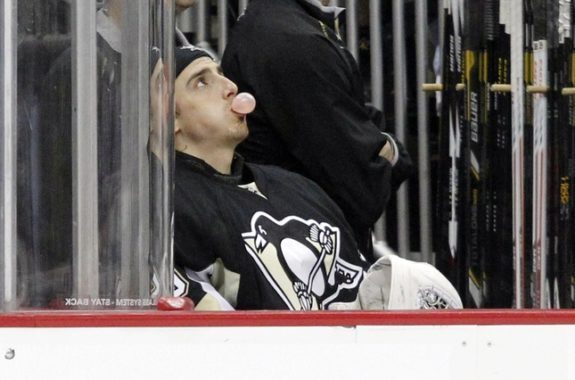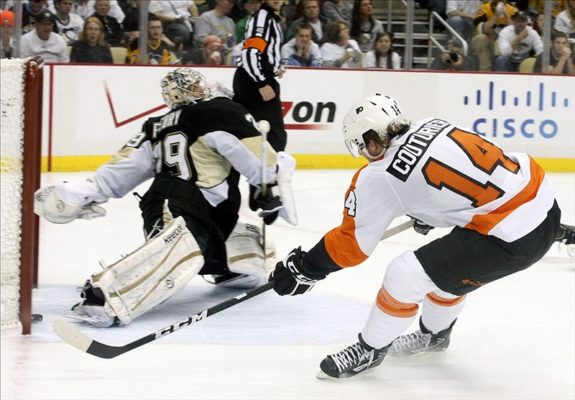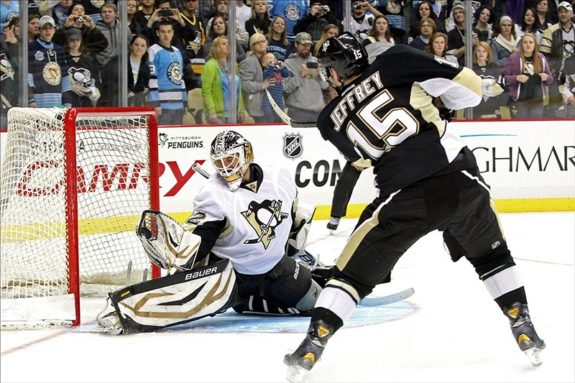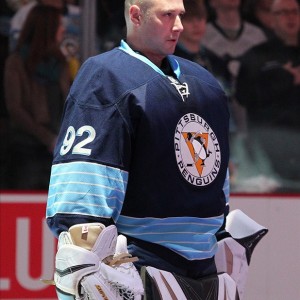
Pittsburgh Penguins head coach Dan Bylsma is going to have a tough decision to make soon.
He’s already made one.
Bylsma replaced franchise goaltender Marc-Andre Fleury after four games of the Penguins first round matchup with the New York Islanders. Fleury shut out the Islanders in Game 1, but let up 14 goals over his next three games and forced Bylsma to go with veteran Tomas Vokoun instead.
Vokoun responded with a stellar performance. He got the Penguins out of the first round and has them in position to win a second round matchup with Ottawa on Friday night — allowing 12 goals in six games and trailing only LA’s Jonathan Quick in playoff save percentage.
But the Penguins will falter. They won’t coast to a Stanley Cup. They’ll lose one, two, maybe even three games in the next round or the Finals, and then Bylsma will have to decide how long he sticks with Vokoun.
That also means deciding how long Marc-Andre Fleury — his $5 million franchise goalie — rides the bench.
We’ve discussed the Penguins potential shift in long-term goalie philosophy multiple times in this space (last June after Vokoun was acquired and in April after Pittsburgh signed Eric Hartzell).
Let’s focus on this season.
For Bylsma, part of making that important decision involves knowing your goaltenders. Knowing their mental and physical states while also knowing when your team needs a spark.
Vokoun and Fleury are very different goaltenders, and it goes far beyond the opposite catching hands (Fleury with his left, Vokoun with his right) and eight year age gap. We can’t predict how the coming days and weeks will play out, but it’s worth examining how the two goaltenders differ on and off the ice to gain some perspective.
___________________________________

At age 28, franchise goaltenders are supposed to be in their prime. If you watch Fleury in a Penguins regular season game, you’d think he seems to be right on track.
But the regular season is almost inconsequential for the Pittsburgh Penguins. The playoffs are what really matters for a team that’s expected to challenge for the Stanley Cup every year and since winning the Cup in 2009, the playoffs are where Marc-Andre Fleury continues to fall short.
From a technical standpoint, Fleury still relies on outrageous athleticism to make highlight-reel saves, but he’s become more efficient in the crease. Instead of darting from post to post like he used to in his younger years, Fleury now works to stay in control and square to the puck at all times. A quick push, a little shift, ready and set for the next shot.
He saves the acrobatic splits for desperate situations.
Unfortunately, Fleury’s dreadful performance in the postseason has made every playoff game a desperate situation for him. And that means too much acrobatics.
With every save Fleury fails to make, he almost seems determined to get two saves on the next shot. He gets anxious and chases the puck instead of sticking to the calm, efficient style that leads to his success in the regular season.
When the goals against start to pile up — 26 were allowed in six games against Philadelphia in last year’s playoffs — Fleury’s confidence crumbles. The specific goals don’t bother him as much as letting his team down in critical games.
“It’s losing, that is what is hard,” Fleury said prior to the Ottawa series. “That’s what sucks. A lot of goals [against] and my job is to stop the puck. It’s frustrating but I guess that’s in the past.”
From that perspective, Fleury is just happy to see the team survive the first two rounds of the playoffs, even if that means watching Vokoun start every night instead of him.
“Whatever happens, it’s all about the team,” he said. “I’ve been a part of this team for a long time and I want this team to do good. If I’m in the net or on the bench, I want this team to win. That’s the bottom line.”
Fleury wants to be the starting goaltender, but he also respects Bylsma’s decision to switch to Vokoun for the time being.
“Like everybody else on the team, we all want to play. That’s fine. We’ve been winning and that’s what matters. Nothing personal. I’m looking forward getting another shot at it.”
___________________________________

The relationship between Fleury and his backups has been interesting to watch over the past few years.
Take Brent Johnson, for example. Most fans weren’t able to fully appreciate the influence Johnson had on Fleury. Johnson didn’t have the talent or the resume that Fleury did. He just knew how to handle the backup role.
Johnson had been a backup most of his career and went out of his way to interact with Fleury on a daily basis. As other players quickly filtered out of the locker room after a game, Johnson often stopped by Fleury’s stall and sat down to chat.
Sometimes it was about a specific sequence in the game. Other times it seemed like a conversation totally unrelated to hockey.
The relationship between Fleury and Johnson was strong, but Fleury never felt his job was in jeopardy during Johnson’s three-year tenure in Pittsburgh.
Tomas Vokoun is different.
To be honest, I didn’t know what to expect of him coming into this season. I had witnessed Vokoun smashing his stick over the boards and yelling at his own bench in Florida after teammates hung him out to dry one night against the Penguins.
I also listened to his press conference after he signed with Washington last year. Vokoun had turned down two- and three-year contract extensions at decent money from Florida to chase what he hoped would be a big free agent payday elsewhere. He had seen a goaltender like Ilya Bryzgalov get a nine-year, $51 million deal from Philadelphia, but with most teams already set in goal, the money never came.
Vokoun sounded confused, dismayed, even a little insulted in the press conference. He wasn’t any happier when the Capitals started Michal Neuvirth on opening night instead of him. Combining that impression with the meltdowns on the ice, I assumed Vokoun would be a fiery character in the locker room.
He’s been exactly the opposite.
When the Penguins allowed a shorthanded goal with 28 seconds to go in Game 3 against Ottawa and then later lost the game in double overtime, the questions came at Vokoun fast and furious from the media.
“Tomas, how do you recover from such a devastating letdown?”

Vokoun’s response was more casual than a Sunday morning stroll.
“Tomorrow’s a new day and it’s just a game,” Vokoun said. “We’re still up 2-1 [in the series] and we’ve got a big game on…whatever [day] the next game is.”
He didn’t even know when the next game was. Quite frankly, he didn’t even care.
It’s not that he isn’t competitive or doesn’t want to win. It’s just that at age 36, Vokoun never thought he’d get an opportunity to be a starting goaltender in the playoffs again.
“That’s one of the advantages for me,” he said. “I don’t think I have to feel any kind of pressure going forward. That makes it a little easier and it’s just nice to have that chance. You play hockey to be in this moment. You don’t play hockey to take the morning skates.”
Part of the reason Vokoun has been able to last 14 years in the NHL when so many other goalies haven’t is his ability to adapt. The same can be said of Martin Brodeur. The game has changed so much over the years and the goaltender position has evolved. 5-foot-10 quick goalies have been replaced with 6-foot-6 butterfly-style goalies from Europe who take up the entire net.
Vokoun still stays on his feet a lot more than a modern-day goalie like Anaheim’s Jonas Hiller — who spends half of the game on his knees in the butterfly position — but Vokoun is willing to drop down to the ice when necessary. He’s willing to roll and flop around to stop a rebound. He’s willing to snatch a wrist shot with his glove or let the puck simply hit him in the shoulder.
His style is unorthodox. Maybe even a little like Tim Thomas or Dominek Hasek in that respect. Vokoun isn’t nearly as active at those two goalies, but he’s willing to do anything necessary to stop a puck.
That might be why Thomas, Hasek, and Vokoun have been able to have so many years of success in the NHL. How do you gameplan for a goalie who improvises and doesn’t really have a specific style?
As a shooter, when you know Henrik Lundqvist plays very close to the goal line and goes down on most shots in close, you aim for the upper corners. If Vokoun has a specific weakness like that, I haven’t been able to figure it out.
You could criticize his rebound control, especially with regards to the volume of shots he’s willing to let hit off his body and drop to the ice. I’m no goalie expert, but after watching Fleury and Vokoun back to back all season, I think Vokoun is also much smarter with where he directs his rebounds. Ten rebounds directed to safe areas on the ice where defensemen can clear the puck often leads to less goals against than one rebound that falls into the slot and onto the stick of an opponent.
Knowing where to direct those rebounds comes from experience. 14 years in the NHL also gives Vokoun the perspective to understand what Fleury has been going through.
“It’s easy for some people to blame one person,” Vokoun said. “As a goalie, I know first-hand how hard it is. Sometimes, even when you do the right thing, things just don’t go your way. That’s normal with anything in life.”
“Some of those goals were tough breaks and I told him he looked good. He wasn’t guessing. It wasn’t like he was getting beat by straight shots. Some were deflections off a body. It’s almost that if you want it too much, you’re somewhere earlier than you’re supposed to be and it’s actually hurting you more.”
The goaltending position is also different from any other on the team. No one is talking about the outrageous number of goals that Kris Letang has been on the ice for in these playoffs because he’s made up for it at the other end of the ice. Goalies don’t have that opportunity. Their job is to stop the puck, and when they don’t they’re perceived as failures.
“It’s funny the way things work sometimes for goalies,” Vokoun said. “The toughest part is there’s nobody to help you. If the defense or forwards [make mistakes], they always have the luxury of hoping the defense or the goalie will get it. We don’t. People who have never been in that situation can’t even imagine how hard it is mentally.”
No one will know if Fleury has recovered mentally until he gets another start in goal for the Penguins.
For now, Vokoun says he is just doing his job and trying to help the team win hockey games.
“You play all those years because you want to have a chance to make a difference and be in playoff hockey. Over the years, when I was on other teams and we didn’t make the playoffs, you realize how special it is. You always envy the guys you see on TV playing for [the Stanley Cup] and you don’t have that chance. I think from that perspective you really have to embrace it.”
___________________________________